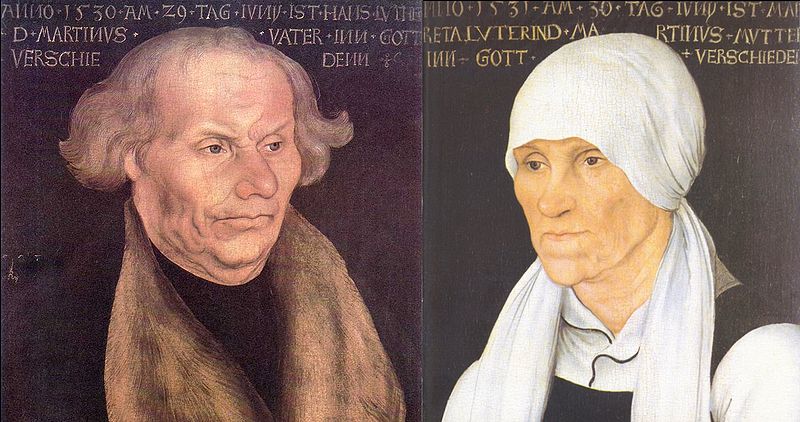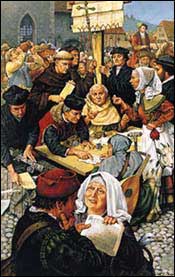
 |
| Martin Luther |
Last night, Roy and I watched a PBS DVD on Martin Luther. Excellent.
 |
|
Portrait of Martin Luther’s parents of Lucas Cranach
|
* * *
 |
|
Johann Von Staupitz
|
 |
|
Big Business–The Catholic Church of Luther’s Day.
|
* * *
Despite the Papal Bull of excommunication, despite the fact that his life would be in danger if he fell into the hands of the Catholic Church, Luther continued with his attacks on it.
“I decided to believe freely and to slave to the authority of no one , whether council, university or pope. I was bound not only to assert the truth but to defend it with my blood and death,” he wrote.
* * *
He discovered a new and powerful weapon on his side–the printing press. For movements to spead, their ideas needed to spread.
The printing press invented in Germany by Gutenberg 30 years before the birth of Luther was to Luther’s day what the internet is to our day. It meant that ideas could travel. They could not be stopped.
“German money in violation of nature flies across the Alps.”
* * *
* * *
Luther was summoned before the Holy Roman Emperor, Charles V at the famous Diet of Worms. Cardinal Aleander, representing the Pope, showed Luther a pile of his books, and asked him if he wrote them, and was willing to recant. Interestingly, for he was just a human being after all, and one potentially facing death at the hands of an unjust institution, he asks for 24 hours to consider his response. Which is famous.
 |
| Luther at the Diet of Worms |
“I do not accept the authority of Popes and councils for they have often erred and contradicted themselves. I am bound by the Scriptures I have quoted and my conscience is captive only to the Word of God. I cannot and will not recant anything for to go against my conscience is neither right nor safe. Here I stand. I can do no other. God help me. Amen.”
One of history’s greatest declarations of exhausted defiance!!
Luther’s statement marks the dawn of a new era, the ordinary person standing up against authority.
It’s a grand moment when an individual ends up standing for something much larger than himself.
He fully expects that the Church will sentence him to death as a heretic, as it did the Czech reformer, Jan Hus (who also appeared at a Council under a guarantee of safe conduct). However, the vote is inconclusive. Luther is free, though his life is in danger from the Catholic church, which combined spiritual, administrative and judicial authority (a dangerous situation).
* * *
Going from the peaks of glory, attention and notoriety to anonymity and invisibility is a frequent Christian experience.
So Luther goes from the drama and intense experience, the elation and energy of the Diet of Worms to a solitary existence hidden in the Wartburg Castle. He regresses into depression, despair and anguish, introspection and melancholy, and had a strong sense that the devil was tormenting him.
And yet again, he snapped out of depression by using the Prozac which had worked in the past: Work.
* * *
And while he was in the Wartburg, Germany’s Peasant Revolts commenced, sparked by Luther’s ideas and writings. Luther was horrified as he saw the destruction the reformation entailed. His ideas turned out to be more radical than he had realized.
Disappointly, he does not support the revolting peasants, but attacks them in vicious prose.
* * *
Concluding comments from the scholars on the program:
“When I die, I want to be a ghost, so that I continue to pester the bishops, priests and godless monks so that they can have more trouble with a dead Luther than they had before with a thousand living ones,” Luther wrote.
Click button to share on Facebook, Twitter, Digg, Delicious, Reddit … Wikio
Read my new memoir: Rosaries, Reading, Secrets: A Catholic Childhood in India (US) or UK.
Connect on Facebook: https://www.facebook.com/anitamathiaswriter/
Instagram: https://www.instagram.com/anita.mathias/
Twitter: https://twitter.com/AnitaMathias1
My book of essays: Wandering Between Two Worlds (US) or UK


